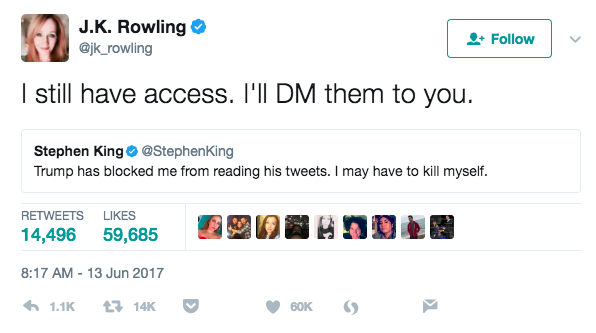J.K. Rowling's Response to Trump's Twitter Behavior Reveals Important Public Information Concerns
By:
Author Stephen King on Tuesday joined a growing list of people, both private citizens and celebrities alike, to be blocked by President Donald Trump on Twitter.
A response sent by British children's novelist J.K. Rowling, promising to relay Trump's tweets to King via direct message, quickly went viral.
 Twitter.com - twitter.com
Twitter.com - twitter.com
While two celebrities bantering over social media is nothing new, what Rowling and King tweeted to each other is a symptom of what's starting to become a major issue in government communication: President Trump blocking people on Twitter.
Users blocked by Trump can't see what he tweets, or even look at previous tweets. Essentially, access to the president's feed has been cut off for these people, shutting them out of his preferred method of communicating with the masses.
Trump was no stranger to blocking people on Twitter in his pre-presidential days, having banned everyone from comedians to an account ostensibly controlled by a cat.
But the blocking seems to have only increased since Trump became president. While there's no fixed list of who Trump has blocked on Twitter, people frequently use the social media service to announce they've been shut out of the president's feed. Some are celebrities, while others are ordinary citizens who tweeted a mild insult at the president, and still others are veterans and veteran advocacy groups.
But once he became president, Twitter blocking began to take on both constitutional implications. Scholars wondered whether preventing someone from reading messages from the chief executive was a violation of the First Amendment, and might have legal ramifications.
The Knight First Amendment Institute, a free speech advocacy group at Columbia University, sent the president a letter saying his blocking of two particular accounts belonging to people who'd merely tweeted harmless insults, violated their First Amendment rights.
“We write on behalf of individuals who have been blocked from your most-followed Twitter account, @realDonaldTrump, because they disagreed with, criticized, or mocked you or your actions as President,” the Institute's letter states. “This Twitter account operates as a 'designated public forum' for First Amendment purposes, and accordingly the viewpoint-based blocking of our clients is unconstitutional."
The letter also makes clear that if access to all blocked accounts isn't restored, legal action will be taken.
Meanwhile, Democratic Rep. Mike Quigley of Illinois has introduced a bill that would prevent Trump from deleting tweets. Called the "COVFEFE Act," after the president's now infamous late night typo-ridden tweet, the bill would "amend the Presidential Records Act to include the term 'social media' among the materials that are documented, 'ensuring additional preservation of presidential communication and statements while promoting government accountability and transparency,'" according to NPR.
While matters of Twitter blocking and deletion might seem silly, White House Press Secretary Sean Spicer has made it clear that tweets sent from the president's personal account are official presidential statements. As Quigley said in the press release touting his bill, "President Trump's frequent, unfiltered use of his personal Twitter account as a means of official communication is unprecedented."
Blocking these messages from citizens and deleting them from official records is a serious matter related to information access, censorship, and national memory. No amount of direct messages between celebrities can solve the problem.
